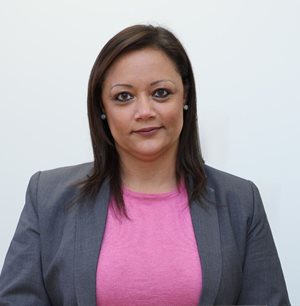Imagine if AI wore lipstick: A leap towards inclusive innovation

In my mind, if AI wore lipstick - it would embrace the boldness, nuance, and complexity that come with understanding and representing the diverse spectrum of human experience, particularly in Africa, where this narrative is one of empowerment, inclusion, and the breaking of traditional barriers that have long hindered women's full participation in various spheres of life, including finance, healthcare, recruitment, and education.

Building on this year's International Women’s Day theme, Invest in women: Accelerate progress, AI can be the tool that propels this investment forward. By incorporating AI into financial services, we can peel back the layers of exclusion and build a foundation of inclusion and empowerment. This shift is crucial in regions like Africa, where technology is not just a luxury but a lifeline - a means to leapfrog over traditional barriers and accelerate progress.
AI is becoming a catalyst for change in the financial sector, especially in Africa, where the digital revolution is bridging the vast chasms of financial exclusion. The rise of mobile money and digital banking platforms, fueled by AI, has led to a significant leap in financial inclusion. For example, mobile money adoption in East and West Africa has surged, almost doubling financial inclusion rates from 23% to 43% between 2011 and 2017. This growth has been particularly beneficial for women, with countries like Senegal and Kenya witnessing a 600% increase and a doubling in the number of women's accounts, respectively. These platforms provide women with secure and convenient ways to manage their finances and empower them with greater autonomy in household decision-making and savings.
However, the journey is not without its challenges. AI, while a tool for financial inclusion, can also perpetuate existing biases if not carefully designed and monitored. For instance, algorithmic biases in digital credit applications can inadvertently exclude women by relying on data points that do not account for women's unique behaviour patterns or constraints, such as higher responsibilities for unpaid care or lower access to smartphones and the internet.
Initiatives like those by Women’s World Banking, in collaboration with the University of Zurich, are pivotal in addressing the challenges posed by algorithmic biases in digital credit applications. They have explored how algorithms in digital credit applications can be adjusted to increase lending to women borrowers, studying the applications of machine learning and AI to remove biases in lending. This approach is crucial as it acknowledges and corrects that traditional data points used in credit scoring may not fully represent women's financial behaviours or constraints, such as their likelihood to operate in the informal sector or their mobile phone and internet use patterns.
Such efforts are essential in ensuring that the digital revolution in finance leads to inclusive growth, where women are not only participants but also beneficiaries of the financial sector's evolution. By addressing the root causes of bias and designing AI systems with a gender-inclusive lens, the potential for AI to change the landscape of financial inclusion for women in Africa is immense.
Bridging the gap from financial inclusion to healthcare, the transformative impact of AI is equally compelling. Just as AI-driven platforms are revolutionising financial services for women in Africa, innovative healthcare applications are leveraging this technology to overcome traditional barriers to medical access. The challenges women face in accessing healthcare on the continent - ranging from geographical remoteness to socio-economic constraints - underscore the urgency of such innovations.
As a working mother, the promise of AI-driven platforms like Unu Health hits close to home. Balancing work and family responsibilities often leaves little time for personal health management. Technology that offers personalised medical advice and diagnostic services through smartphones gives a direct line to healthcare that is not just about convenience but about having peace of mind. This is especially vital for mothers in low-income families, where healthcare might otherwise be a luxury they cannot afford or access. The democratisation of medical services means that women in the most remote or underserved regions have the power to prioritise their health and well-being.
Yet again, the journey towards leveraging AI for equitable healthcare access is not without its hurdles. The same biases and design challenges observed in financial AI applications can manifest in healthcare, potentially skewing diagnostics or treatment recommendations. Furthermore, the digital divide - exemplified by disparities in smartphone ownership and internet access between genders - poses a significant challenge, potentially limiting the reach and impact of these AI-driven healthcare solutions. As we confront these hurdles in healthcare, it becomes evident that the principles of fairness and inclusivity must extend beyond patient care into the fabric of the tech industry, particularly in recruiting and retaining women in tech roles.
This need for inclusivity in tech employment is not just about filling positions; it's about fundamentally reshaping the industry to reflect the diversity of the world it serves. By employing AI to counteract biases in recruitment, we pave the way for a more diverse workforce capable of tackling the nuanced challenges of AI in healthcare and beyond. In this light, the drive to recruit women into traditionally male-dominated fields is not merely a step towards gender diversity but a leap towards a more equitable, innovative, and inclusive technological future. As AI continues to revolutionise industries, its role in fostering diversity in the tech workforce becomes crucial to ensuring that AI solutions are as broad-minded and inclusive as the diverse populations they aim to serve.
Similarly, these principles can be applied to educating girls. Incorporating AI into educational initiatives, particularly in STEM, presents a transformative opportunity to enhance learning experiences and outcomes for girls and young women in Africa. Huawei's Seeds for the Future programme is a prime example of how AI and technology can be harnessed to empower the next generation of female leaders in tech. This initiative provides access to AI and digital technology courses, fostering an environment where young women can develop critical skills in these emerging fields.
Moreover, Huawei's DigiSchool project in South Africa showcases the practical application of AI in education by utilising digital platforms to improve English comprehension in primary schools. This foundational skill underpins success in STEM subjects. Through AI-driven educational content and connectivity solutions, the project is making strides in overcoming traditional educational barriers, such as limited access to quality resources and personalised learning experiences.
The role of tailored, context-aware AI applications becomes clear in addressing these challenges. This evolution of AI, metaphorically adorned with "lipstick," signifies a move towards a future where technology is harnessed for inclusivity and empowerment. While significant strides have been made, the path ahead remains filled with challenges that necessitate a cautious and conscious effort to ensure AI's benefits are equitably distributed. The ongoing integration of AI into various facets of life in Africa presents a canvas of opportunity - to drive gender equality forward and envision a future where technology acts as a bridge, connecting women across the continent to a world of empowerment and inclusion. This hopeful glimpse into the future emphasises the potential of AI to transform societies, making it imperative to navigate its evolution with a commitment to inclusivity and equity.
About Christina Naidoo
Christina Naidoo is the COO at Huawei South Africa.- South African hoteliers: Your reality matters04 Nov 14:18
- 1st for Women wins Best in Service at the Ask Africa Orange Index Awards02 Oct 12:13
- Unlocking the economic potential within South Africa’s township economy26 Sep 11:18
- Beyond the hustle: The quiet revolution of women redefining strength and success in South Africa22 Sep 15:08
- Burnout is out: Reclaiming your right to exhale17 Sep 12:40










































